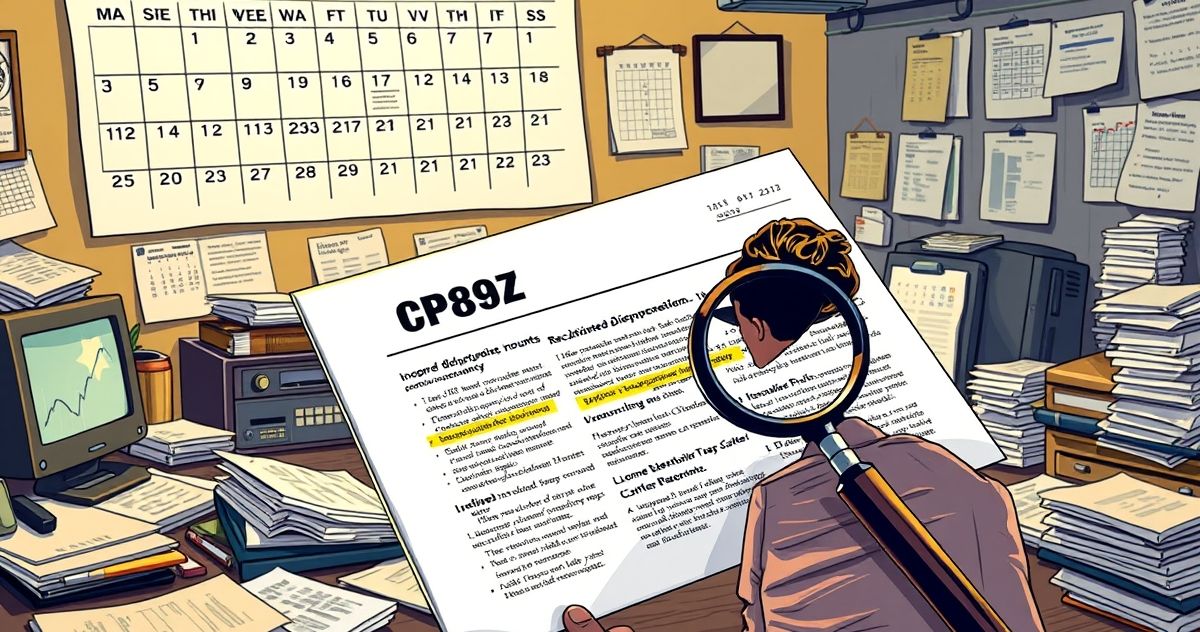Understanding the CP89Z Notice: A Comprehensive Guide
The CP89Z Notice, a crucial communication from the Internal Revenue Service (IRS), serves as an official acknowledgment to taxpayers that substantial modifications have been made to their tax accounts. These modifications usually stem from IRS reviews identifying discrepancies in previously filed returns, necessitating a recalibration of reported income, deductions, or credits. This notice informs taxpayers about adjustments that could involve reassessed refunds or additional taxes owed.
What is the CP89Z Notice and Its Primary Purpose?
The CP89Z Notice’s foremost purpose is to notify taxpayers of the IRS-determined corrections affecting their tax returns. These corrections could encompass income, deduction, or credit discrepancies, pinpointed through cross-referencing taxpayer data against third-party reports (like W-2s or 1099 forms). The ultimate goal is precise accuracy in reported tax data, ensuring compliance with tax regulation standards.
Key Features of the CP89Z Notice
- Correction Details: The notice provides a comprehensive summary of any changes made to the taxpayer’s account, with each adjustment explained individually. Corrections may involve reconciling reported income against available data or adjusting improperly claimed deductions or credits.
- Impact on Refunds or Balance Dues: The CP89Z Notice outlines the financial repercussions of the corrections, which might include a revised refund amount or an indication of additional taxes owed. It’s structured to ensure the taxpayer understands the adjustment’s financial impact on their tax standing.
- Instructions for Action: If actions such as payment or documentation submission are necessary, the notice specifies how to comply. This clarity guides taxpayers in responding to notices effectively, facilitating seamless resolution.
- Payment Information: For balances now due, options for payment, including online methods and installment plans, are detailed comprehensively to encourage timely taxpayer actions.
Filing or Compliance Requirements
Receiving a CP89Z Notice signals a need to carefully assess the detailed explanations of tax data discrepancies. Taxpayers might need to provide additional documentation or support for previously claimed items. There might also be the necessity of filing an amended tax return to correct unaddressed issues, ensuring all aspects of the tax return comply with regulatory expectations.
Penalties or Consequences for Non-Compliance
- Financial Penalties: Unresolved discrepancies leading to underpayments can accrue penalties and interest, compounding outstanding balances and resulting in higher overall taxpayer debt.
- Collection Actions: Ignoring the CP89Z Notice can trigger enforcement measures like tax liens or levies, as the IRS seeks to recuperate owed funds.
- Increased Audit Risks: Continuous oversight corrections or disregard for notice directives heightens the chance of an IRS audit, magnifying taxpayer inconvenience and potential financial impact.
Importance of the CP89Z Notice in Tax Resolution
The CP89Z Notice is pivotal in enabling precise tax liability calculation, playing a substantial role in tax debt resolution. By registering IRS adjustments and responding promptly, taxpayers can manage outstanding tax disputes proactively, potentially mitigating or avoiding future tax burdens. The CP89Z also serves as a reminder of the importance of accurate tax filing, inspiring improved taxpayer diligence in subsequent filings.
By promptly addressing discrepancies reported in the notice, taxpayers stand to:
- Minimize Penalty Accruals: Quick resolution minimizes additional costs associated with penalties and interest, facilitating more manageable tax settlements.
- Negotiation Leverage: Recognized discrepancies allow taxpayers to negotiate amendments or engage in settlement agreements like offers in compromise.
- Avert Aggressive Recovery Actions: Prompt adherence to notice instructions significantly reduces the likelihood of IRS-led recovery procedures like levies or liens.
Ultimately, comprehending and reacting appropriately to CP89Z Notices ensures a taxpayer’s continued financial health by preemptively addressing and resolving tax discrepancies.
Conclusion: Staying Proactive with CP89Z Notices
Receiving a CP89Z Notice should be seen as a timely prompt for direct action, safeguarding against future financial complications. It embodies a call to increase attentiveness towards tax return accuracy while offering a path to resolve discrepancies early on. By embracing the notice’s directives, taxpayers can sustain their financial compliance, averting added financial burdens while fostering a more transparent relationship with IRS requirements.

